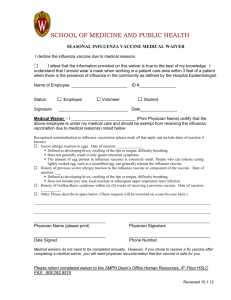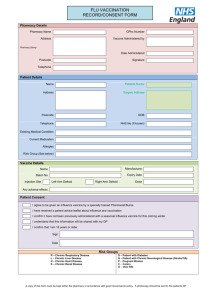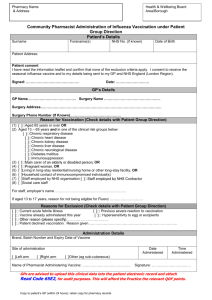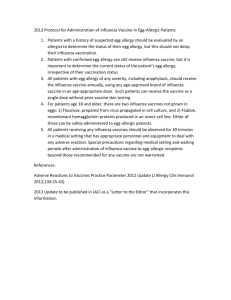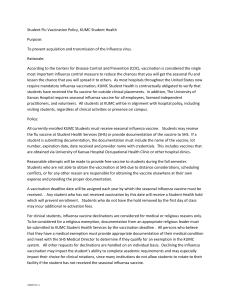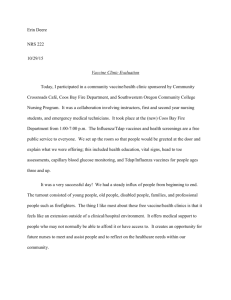File - Elizabeth Degelbeck
advertisement
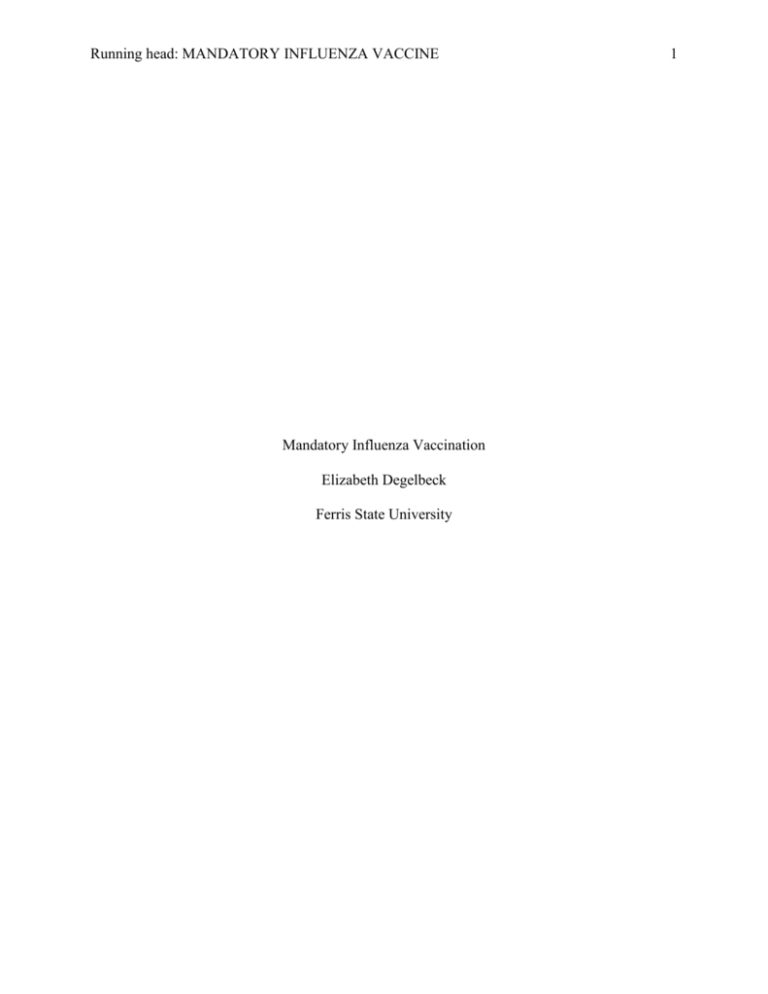
Running head: MANDATORY INFLUENZA VACCINE Mandatory Influenza Vaccination Elizabeth Degelbeck Ferris State University 1 MANDATORY INFLUENZA VACCINE 2 Mandatory Influenza Vaccination Influenza is a highly contagious virus that spreads via droplets through sneezing or coughing (FAAP, 2012). Clinical manifestations include fever, chills, headache, muscle aches, and a nonproductive cough. Other subsequent manifestations include sore throat, nasal congestion, and a more prominent cough (FAAP, 2012). Once a person becomes infected, that person is able to shed the virus from one day before symptoms are noticed and for another five to ten days following (Randall, Curran, & Omer, 2013; McLennan & Wicker, 2010). This virus is considered one of the leading causes of death with an average of 36,000 deaths and over 200,000 hospitalizations per year in the US (Vondrak, Starling, & Guzman, 2013). The patients that are at higher risk for developing complications from influenza virus include the elderly, the young, and the immunocompromised (Randall, et. al, 2013) who will have a more severe, prolonged illness that could ultimately lead to death (McLennan & Wicker, 2010). The flu season typically begins in the fall and lasts until spring. Vaccines are offered throughout this time and promise to give immunity to the latest influenza strains. The vaccines are reformulated every year by epidemiologists based on which strain is the most active in other parts of the world (FAAP, 2012). Health care workers are the first in line to help manage ill patients, especially with influenza-like illnesses. Influenza vaccinations are not yet mandated nationally, but most hospitals are moving toward that direction. This idea brings a controversial topic to the table. Should influenza vaccinations be mandated for all health care workers? Pro-Mandatory Influenza Vaccination There are many reasons that employers are now moving towards mandatory influenza vaccination. One study states unvaccinated healthcare workers have been linked to influenza outbreaks. Employers believe that employees should have an ethical feeling to do no harm to MANDATORY INFLUENZA VACCINE 3 patients and protect both the safety of the patient and the public (Randall, et. al, 2013). Studies also say that it is inherent that health care workers protect the older population, whom the vaccine is not as effective on, and provide a sort of “herd immunity” to these patients (McLennan & Wicker, 2010). Herd immunity also protects other staff that has received the vaccine and reduces the risk for an outbreak. Outbreaks in a healthcare system have been associated with a lower risk of influenza vaccination among employees (Vondrak, et. al, 2013). Other studies have shown that influenza vaccination among healthcare workers increase the vaccination rates among patients. Patients are more confident receiving the influenza vaccination if their physician or nurse demonstrates positive healthy behaviors (Abramson, 2012). They accept guidance with more ease and trust that physicians are relaying the proper information. Health care workers in return will not feel hypocritical when enforcing influenza vaccinations among their patients (Deldon, et. al, 2008). If a health care worker chooses to refuse the influenza vaccination, employers give the health care workers options during the flu season. Declination forms are available to the health care worker to fill out and explain why they are refusing the vaccine. This lets the health care worker to achieve a sense of autonomy. It also allows the employer to educate in areas where needed to improve vaccination rates among their facility (McLennan & Wicker, 2010). Other hospitals have gone to the extreme with their mandated influenza vaccinations and will terminate anyone who refuses (McLennan & Wicker, 2010; Vondrak, et. al, 2013). Some hospitals have combined declination forms and allowing unvaccinated health care workers to work in other areas where vulnerable patients are not cared for (McLennan & Wicker, 2013). MANDATORY INFLUENZA VACCINE Against Mandatory Influenza Vaccination There are also many reasons circulating why not to mandate flu vaccines. One reason is that the healthcare worker is allowed to practice autonomy and make their own decisions about what products are going to be administered in their body (Randall, et. al, 2013; Vondrak, et. al, 2013). Some studies show that there is a lack of evidence to support that vaccinating healthcare workers protects long-term care facility residents from contracting the virus (Gardam & Lemieux, 2013; Evans, 2012). Also, other studies have shown that the influenza vaccine only provides 60% protection in healthy adults (Gardam & Lemieux, 2013; Evans, 2012). In fact, in January 2013, the US Centers for Disease Control and Prevention stated that for the 2012-2013 influenza season, the vaccination was 55% effective against laboratory confirmed influenza A (Gardam & Lemieux, 2013). OSHA has also stated that the vaccination has an abundance of variability in its effectiveness and preventing life threatening illnesses (Evans, 2012). Gardam and Lemieux stated that influenza vaccinations are “based on expert and organizational opinion rather than data” and “the system overestimation of vaccine effectiveness has hampered the identification of better solutions” (2013). There are many reasons why employees refuse to become vaccinated. These reasons include fear of adverse reactions, doubts of vaccine efficacy, inconvenience, cost, and doubts that they will be infected with the virus (Randall, et. al, 2013; Vondrak, et. al, 2013). Some adverse reactions that health care workers are in fear of include nausea, vomiting, allergic reaction, and influenza-like illness. Other more serious reactions include Stevens-Johnsons syndrome, meningitis, paralysis of the face, Guillain-Barre syndrome, myelitis, and other neurologic disorders (Hieb, 2013). 4 MANDATORY INFLUENZA VACCINE 5 One study has shown that vaccinating healthcare workers does not decrease the transmission of the virus to patients (Offley, 2013). Thomas states in his statement that “flu vaccines cannot cover all strains, so they are targeted to cover those strains that epidemiologists expect to cause the most morbidity and mortality that season” (2012). So as one can see, it is no wonder why employees feel that the vaccine is not worth the pain. Thomas also stated that a health care worker should get the choice to protect themselves and their patients, not mandate it (2012). Conclusion In conclusion, there are many reasons why a health care worker should and should not receive the influenza vaccination. More research is needed to prove the effectiveness of vaccination, but health care workers must also weigh the risks and benefits of the influenza vaccination before receiving it. It is vital that health care workers educate themselves to ensure that they are doing what is best for the patient, themselves, and the community. MANDATORY INFLUENZA VACCINE 6 References Ambramson, Z. H. (2012). What, in fact, is the evidence that vaccinating healthcare workers against seasonal influenza protects their patients? A critical review. International Journal of Family Medicine. doi: 10.1155/2012/205464 Banach, D. B., Zhang, C., Factor, S. H., & Calfee, D. P. (2013). Support for mandatory health care worker influenza vaccination among allied health professionals, technical staff, and medical students. American Journal of Infection Control, 41, 354-356. http://dx.doi.org/10.1016/j.ajic.2012.05.019 Behrman, A., & Offley, W. (2013). Should influenza vaccination be mandatory for healthcare workers? BMJ. doi: 10.1136/bmj.f6705 Cortes-Penfield, N. (2013). Mandatory influenza vaccination for health care workers as the new standard of care: A matter of patient safety and nonmaleficent practice. American Journal of Public Health, e1-e6. Delden, J. J. M., Ashcroft, R., Dawson, A., Marckmann, G., Upshur, R., & Verweij, M. F. (2008). The ethics of mandatory vaccination against influenza for health care workers. Vaccine, 26, 5562-5566. doi: 10.1016/j.vaccine.2008.08.002 Evans, G. (2012). OSHA strongly opposes feds move to mandatory flu shots for HCWs. Hospital of Infection Control Prevention. FAAP. (2012). Report of the committee on infectious diseases (29th Ed.). http://0online.statref.com.libcat.ferris.edu/Document.aspx?fxId=76&docId=57 Gardam, M., & Lemieuz, C. (2013). Mandatory influenza vaccination? First we need a better vaccine. CMAJ, 185(8), 639-640. doi: 10.1503/cmaj.122074 MANDATORY INFLUENZA VACCINE 7 Gligorov, N, & Thomas, D. C. (2012). Should the flu vaccine be mandatory for health care workers? The Journal of Nurse Practitioners, 8(10), 790-791. http://dx.doi.org/10.1016/j.nurpra.2012.09.011 Hieb, L. D. (2013). Letter to hospital authorities on mandatory influenza vaccination. Journal of American Physicians and Surgeons, 18(2), 47-49. McLennan, S, & Wicker, S. (2010). Reflections on the influenza vaccination of healthcare workers. Vaccine, 28, 8061-8064. doi: 10.1016/j.vaccine.2010.10.019 Music, T. (2011). Protecting patients, protecting healthcare workers: a review of the role of influenza vaccination. International Nursing Review, 161-167. Poland, G. P. (Ed). (2010). Mandating influenza vaccination for health care workers: Putting patients and professional ethics over personal preference. Vaccine, 28, 5757-5759. doi: 10.1016/j.vaccine.2010.07.057 Randall, L. H., Curran, E. A., & Omer, S. B. (2013). Legal considerations surrounding mandatory influenza vaccination for healthcare workers in the United States. Vaccine 31, 1771-1776. http://dx.doi.org/10.1016/j.vaccine.2013.02.002 Starke, J. R. (2010). Recommendation for mandatory influenza immunization of all health care personnel. Pediatrics, 126, 809-815. doi: 10.1542/peds.2010-2376 Stewart, A. M. & Cox, M. A. (2012). State law and influenza vaccination of health care personnel. Vaccine, 31, 827-832. http://dx.doi.org/10.1016/j.vaccine.2012.11.063 Vondrak, K. K., Starling, P, & Guzman, J. (2013). Mandatory influenza vaccination: Is it part of the answer? Nursing Management, 38-42. doi: 10.1097/01.NUMA.0000432223.17252.80
